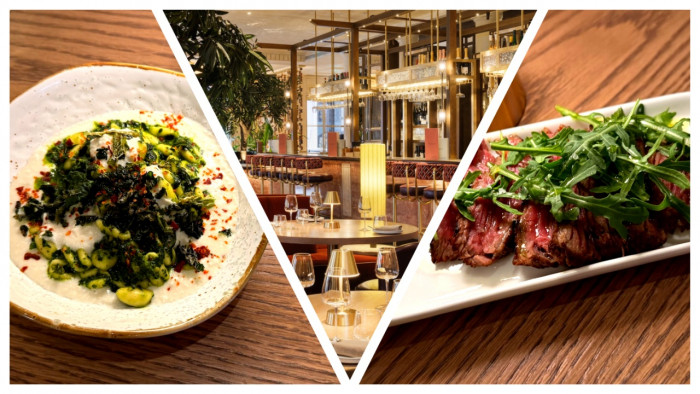Time was when men had ‘real’ jobs. ShortList’s David Whitehouse joins his dad for a day of manual labour to see the generation gap in sharp relief
My dad has never had ‘a catch-up’. He has never thrown some ideas around or cc’d in a colleague by way of introduction. His hands are as hard as rocks, and he has never used them to fumble with a flipchart while a bunch of his sleepy colleagues pray for lunch — or the end. Whichever comes first.
I, meanwhile, have felt sick enough to work from home, conspired in the gross indignity of a dress-down Friday and informally requested time in the diary of someone I have never met. My hands are soft, my nails clean.
This will be true of the majority of men reading this. Our dads left school expecting to get jobs that made them sweat. We left school expecting to get jobs where we take it in turns to buy cakes to share with people we barely talk to. Modern office life is emasculating us.
Which is why one morning as I sat down miserably at my desk, internet-based procrastination threatening to suck the hours from my day, watching my puny muscles dripping from my arms, I decided to call my dad — now a caretaker at a primary school — and ask if I could go to work with him instead.
“What?” he said, but he heard me the first time.
AN EDUCATION
He tells me to climb a ladder and clean the gutter. I do it. Firstly, because he’s my dad. Secondly, he’s 62. If anyone should be climbing a ladder and mending a gutter, it’s me. Thirdly, because I secretly want to prove I am not the man my fingernails suggest I am. And finally because he’s holding a hammer. I reach the top and genuinely don’t know what to do. He takes over.
I have had an office job for my entire adult life. My dad was in the navy, has been a security guard, an electrician and a builder. I ask him how he thinks he would fare in an office environment, and what he describes sounds like the part in King Kong where the ape becomes over-stimulated by the bright lights and loud noise of New York City and starts lobbing cars around. Except with pens and fax machines.
The digital revolution is changing not only the masculine workplace, but also our relationships with the one man we were raised to emulate. I have never repaired something you can find in a kitchen. My dad has never sent an email. How can we emulate them now?
Though we essentially have different remixes of the same face, asking one of us to understand the way the other spends his days is a sad impossibility. Most of us do not really know what our dad does for much of the time. He gets up before the sun and we rarely finish before it goes down again. The adage remains though that we all become our dads in the end.
But when exactly will that happen?
I am standing on a frozen pavement and my dad hands me a broom.
“What’s this for?” I say.
“Sweeping.”
“Yes, I know that. Sweeping what?”
I look around me and there are leaves everywhere. I think we must become our dads on the day we start giving a toss about leaves.
The school leaver’s uptake of manual apprenticeships is dropping and we gravitate more and more towards the desk job — a life spent producing intangibles which exist only in the ether. Web design. Electronic marketing. Digital strategies.
Look closely and you will see your dad’s eyes rolling back into his head. Our fathers built tower blocks and motorways. We might consider knocking out a new barn on Farmville. Men are getting, well, less manly, and I wonder if it is good for our minds.
I decided to test my theory on a friend, Nathan. He said: “My dad was a labourer on an apple farm when he was young and he fought for the armed struggle against apartheid in South Africa. Then he worked in an office and was miserable — so he got a job in Iran during the revolution and stayed in the war zone and was happy again.” Granted, Nathan’s dad is an extreme example (Nathan isn’t even his real name — I’m not allowed to use it because he said his dad was “too scary”), but a fitting one all the same.
Modern office life is a culture shock for the male species. Evolution has whittled genetics for millions of years to hone it for graft. Darwin could never have predicted that one day we would suddenly invent the modern office, sit down and ‘right click mouse button to save’ for the rest of time.
This could spell bad news for the male psyche. In Fight Club, Chuck Palahniuk prophesied a generation of men disenfranchised by not fitting into the perceived notions of masculinity, who then sought to re-establish their identities by casually kicking each other’s heads in for fun. They were men locked into office jobs, the relative banality of which was signified by the visual motif of a photocopier doing the same thing over and over again. They would fight, on the simplest level, because they wanted to use their bodies. Does a real man worry about his inbox?
LONG-TERM EFFECTS
“It has most effect on ego and pride — self-worth — particularly in those communities where a ‘white collar’ or ‘professional’ job seems unattainable or alien.
“But we only feel ‘less manly’ if we aren’t able to adapt, change and move on,” he adds. “You can [find self-worth] as much on the back of pushing paper as being a brickie. The world of work has changed. If you give up, or aren’t prepared to put in the effort to be the best you can in what you do — whether it’s bringing up a family, laying bricks or pushing paper, then yes, I guess you might end up feeling crap. But you won’t be if you don’t want to be.”
Our day’s work at the school is over. I am shattered, covered in mud and I smell musty. I ask my dad if he’d like to come to work with me next week, where I’ll be mostly typing emails and worrying about how I’ve come across.
“No,” he says. “Your kind of work is a young man’s game.”
Latest
Related Reviews and Shortlists










